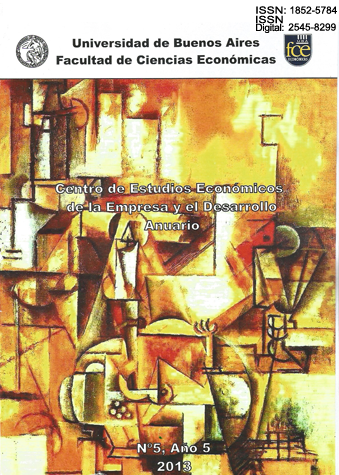Precios, Salarios, Peronismo y Empresa. El caso del Mercado Central de Frutos 1938-1958
Resumen
The agro-export boom of the Argentina's economy in the late nineteenth century demanded the construction of transport networks and storage agricultural and cattle products. This article describes the case of the “Mercado Central de Frutos S.A.”, the biggest storage company of the period. Strategically located near the port of Buenos Aires, it was connected with the rail and river networks. Created in 1887, this enterprise reached its maturity in the early decades of the twentieth century. By mid-century began its decline, and closed its operations in 1965. Some research works explained the decline as a consequence of the economic policies of Peronism (1943-1955). This paper analyze the enterprise performance in the period 1938-1958, from the reports and balance sheets of the company, board decisions and the evolution of wages and prices. From these sources this paper proposes that the company began its decline by changes in the Argentina economy, rather than by trade and labour policies of Peronism.Descargas

Los autores conservan los derechos de autor y garantizan al Anuario Centro de Estudios Económicos de la Empresa y el Desarrollo el derecho de ser la primera publicación del trabajo al igual que licenciado bajo Creative Commons: Attribution-NonCommercial 4.0 International (CC BY-NC 4.0) que permite a otros tanto compartir (copiar y redistribuir) como adaptar (remezclar, transformar y construir a partir del material) el trabajo bajo los siguientes términos:
- Atribución — Usted debe dar crédito de manera adecuada: brindar el nombre el autor y de las partes atribuidas, un aviso de derechos autorales, una nota de licencia, un aviso legal y un enlace al material, brindar un enlace a la licencia, e indicar si se han realizado cambios. Puede hacerlo en cualquier forma razonable, pero no de forma tal que sugiera que usted o su uso tienen el apoyo de la licenciante.
- NoComercial — Usted no puede hacer uso del material con propósitos comerciales.
Los autores pueden establecer por separado acuerdos adicionales para la distribución no exclusiva de la versión de la obra publicada en el Anuario Centro de Estudios Económicos de la Empresa y el Desarrollo (por ejemplo, situarlo en un repositorio institucional o publicarlo en un libro), con un reconocimiento de su publicación inicial en esta revista.
Se permite y se anima a los autores a difundir sus trabajos electrónicamente (por ejemplo, en repositorios institucionales o en su propio sitio web) antes y durante el proceso de envío, ya que puede dar lugar a intercambios productivos, así como a una citación más temprana y mayor de los trabajos publicados.















